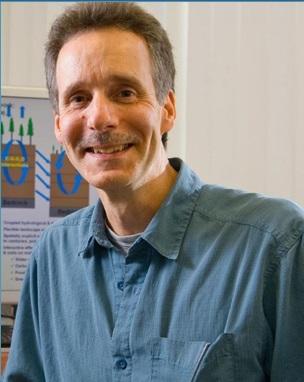Meet EPA Ecologist Bob McKane
Dr. Bob McKane is an ecologist and a team player—he likes working on interdisciplinary teams to develop well-rounded tools that help communities address environmental and public health issues.
 EPA Ecologist Bob McKane!
EPA Ecologist Bob McKane!
Tell us about your background.
I’ve been a Research Ecologist at EPA since 1998. My academic training (Ph.D. University of Minnesota; M.S. University of Washington) is in ecosystem ecology, which is the study of how the physical and biological components within a place – such as a watershed or ecoregion – interact and form a complex system that dynamically regulates how matter and energy flow through both the organisms and abiotic components of the system. Over the past 25 years, I have used and developed a variety of simulation models to understand these interactions and assess how changes in climate and land use affect the capacity of ecosystems to provide important services for our health and well-being. These services include, for example, providing clean water and air, food and fiber, flood control, climate regulation, habitat for fish and wildlife, and recreational and cultural benefits. I am currently leading an interdisciplinary team of scientists to develop and apply a watershed simulator – VELMA (Visualizing Ecosystem Land Management Assessments) – in support of place-based ecosystem service assessments. We are currently using the simulator to evaluate the effectiveness of green infrastructure options for improving water and air quality and ecosystem service co‐benefits.
When did you first know you wanted to be a scientist?
I became very interested in astronomy in grade school and imagined becoming an astronomer someday. During high school my interests shifted to biology and the environment, due in part to the emerging environmental movement and the influence of my father who was a long-time conservationist and community organizer.
How does your science matter?
A main goal of mine and my coworkers is to develop decision support tools that community and tribal stakeholders can use to explore different options for addressing their environmental concerns – for example, which watershed management practices will be most effective for improving water quality and restoring critical salmon habitat? It has been exciting to see watershed council members with no previous modeling experience use VELMA as part of their watershed planning process.
What do you like most about your research?
I enjoy working collaboratively on interdisciplinary projects involving people with diverse skill sets and a willingness to work as a team. Our VELMA modeling team is a good example. We have ecologists, computer scientists, geospatial information system specialists, and policy experts collaborating to build, test, and apply a broadly applicable watershed simulator.
If you could have dinner with any scientist, past or present, who would it be? What would you ask him or her?
Stephen Hawking, because of his amazing mind and determination in the face of ALS. I would ask him to explain his theory of multiple universes in terms that I could understand.
If you weren’t a scientist, what would you be doing?
Probably a forester, the career track I was on before graduate school. It was great outdoor work but I found that I was most interested in trying to understand forest ecosystem patterns and processes.
If you could have one superpower, what would it be and why?
It would be a type of x-ray vision to directly see how water and nutrients cycle and move through plants, soils, and watersheds. The closest we can come to that is by application and measurement of isotopic tracers, and subsequent model-based visualization of the tracer data. Very laborious.
Any advice for students considering a career in science?
Make sure you go into a field that you love. That will help you get through the challenges and frustrations that are part of any career in science.
What do you think the coolest scientific discovery was and why?
It’s hard to choose. For me, the biggest game changers include Darwin’s theory of natural selection, Einstein’s theory of relativity, and the collective endeavor during the past century that gave rise to ecosystem ecology. All of these have had a tremendous impact on how we view our place in the big scheme of things.
What do you think is our biggest scientific challenge in the next 20/50/100 years?
The biggest challenge will be figuring out how to more effectively integrate environmental science with economic and societal decision making. There are scattered signs that this is taking root at local, national and international levels, but progress has been frustratingly slow given the urgency of problems associated with climate change, population growth, and degradation of natural resources.
Whose work in your scientific field are you most impressed by?
I’m most impressed by colleagues who have organized themselves into interdisciplinary teams to address difficult environmental and societal challenges. I’ve been fortunate to have worked with such teams at the Marine Biological Laboratory, National Science Foundation’s Long Term Ecological Research Network, and the EPA Western Ecology Division.
You’re stranded on a desert island with a community of other survivors – what is your job?
I’d be the guy foraging for wild edibles, an old hobby.
Editor's Note: The opinions expressed herein are those of the researcher alone. EPA does not endorse the opinions or positions expressed.
